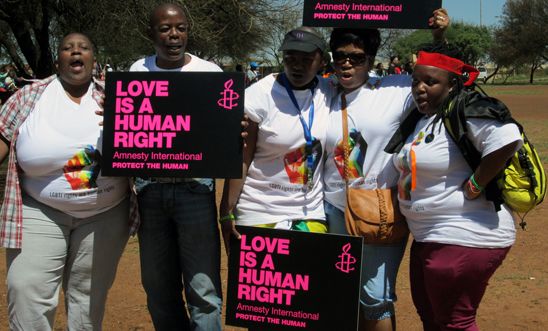
Why we work on sexual orientation and gender identity issues

Jean-Claude spent two years in an overcrowded Cameroon jail, where he was refused vital medical treatment and beaten by the prison guards. When he was arrested in 2011, the police kept Jean-Claude in custody for days, stripping him naked and ruthlessly beating him over and over again. His crime? Sending a text message to another man, telling him that he loved him.
Expressing same-sex desires is illegal in Cameroon; Jean-Claude was just one of many there to have been imprisoned for his perceived sexual orientation. Jean-Claude Roger Mbede died in January 2014, after being ostracised from his family, rejected by his family and being assaulted and punished under the law simply for being who he was.
No matter what your actual or perceived sexual orientation or gender identity, every person on earth should be treated by others and by their governments as equal citizens. But around the world, people are continually persecuted and discriminated against for who they are, and their sexual feelings and consenting behaviour.
We’re working for a world where no one faces discrimination for their sexual orientation or gender identity.
What we mean by sexual orientation and gender identity
Sexual orientation is the way you identify yourself – through desires, feelings and sexual activity, whether that’s towards people of the same sex or opposite sex from you. Gender identity is rooted less in physical identity, and refers to the way you identify with and express yourself in masculine and/or feminine notions of identity.
When talking about issues of sexual identity we often use the term LGBTI: lesbian, gay, bisexual, transgender and intersex. But we acknowledge that individuals may define their sexual identity in ways not limited to just these terms – and terms to describe sexual orientation and gender identity vary widely from culture to culture.
LGBTI rights are human rights, protected by international law
"We should all speak out when someone is arrested or imprisoned because of who they love or how they look. This is one of the great neglected human rights challenges of our time." UN Secretary-General Ban Ki-moon, April 2013
We are each protected against discrimination based on our sexual identity under international human rights law.
Every one of us has right to be free from discrimination, to communicate freely, to gather and meet with others peacefully, to health and to our own private and family life – all of this regardless of our sexual identity or consenting sexual behaviour. We all have the right to be treated equally before the law. We also have the right to life, the right not to be tortured, and the right to be safe from harm.
All of these rights are enshrined in the Universal Declaration of Human Rights. In 2011, the United Nations Human Rights Council passed the first UN resolution to focus on LGBTI issues, and in doing so reaffirmed the duty of international human rights law to make sure that sexual and gender equality becomes a reality.
The reality: discrimination in law
However, in practice, authorities in many countries that have signed international treaties committing them to protect human rights continue to rule with legislation that singles out and discriminates against individuals for their sexual orientation.
Consensual same-sex relations are illegal in some 78 countries. And being gay or lesbian could see you sentenced to death in Iran, Saudi Arabia, Yemen, Mauritania, Sudan, as well as some regional states in Nigeria and Somalia.
Discrimination in society
Legislation alone won’t prevent hate crimes from happening – the law needs to be enforced. But in states where legislation protects the rights of LGBTI individuals, it often is not implemented properly; in many countries homophobia and transphobia are entrenched within the police force, and there are frequently flaws in the investigation and the prosecution of LGBTI hate crimes.
Support our work to end LGBTI discrimination
Our LGBTI work takes many forms, including:
- Monitoring and recording cases of LGBTI discrimination against individuals or groups
- Reminding state authorities of their duty under international law to protect the equal rights of LGBTI citizens – through public campaigns and behind-the-scenes lobbying
- Campaigning for events celebrating LGBTI rights – like Pride festivals –to go ahead safely with support from the authorities, and protection from hate groups
- Highlighting cases of individuals who have been punished or discriminated against because of their sexual identity or gender orientation.
Join our campaigning network
We need you to help defend LGBTI rights
Our LGBTI Network is formed of people from all over the UK, focusing on LGBTI issues, and working with our head office to campaign and lobby for equal rights. You don’t have to be a member of Amnesty to get involved. Find out more and sign up